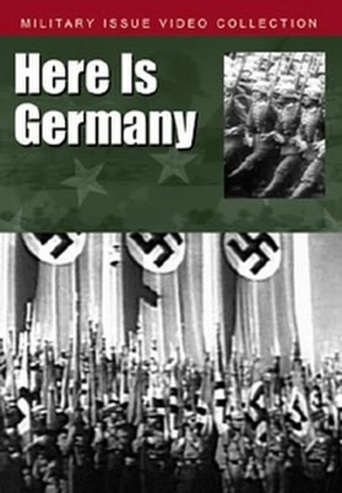dougdoepke
The first few minutes are shockingly repellent, yet necessary viewing. The mountains of corpses in various stages of desiccation and decomposition are, as they say, mute testament to the horrors of war. In this case, they are apparent atrocities committed in the name of the Third Reich. But why not a single mention anywhere of the Nazi's chief victims, the Jews. It might have also been instructive to include gore from the fire-bombing of Dresden or the A-bombing of Nagasaki. But then this is a propaganda film through and through, and I would think an embarrassment to the prestigious names attached to it.The chief propaganda technique is to decontextualize Germany's history, such that its militarist tradition—the movie's chief culprit—looks like it occurred in an historical vacuum. That way such WWII allies as France, Great Britain, and Russia cum Soviet Union, are not implicated in the rise of that tradition. Yet, each of these allies went through their own periods of militaristic expansion in pursuit of empire, as did the US in its steady westward expansion. Can we really blame one wolf for holding its own among the rest of the pack. Contrary to the film, pacifying a militaristic Germany really requires pacifying the entire pack, much as the EU has helped to do.No need to go on with the selective vision of the filmmakers. After all, the production never really saw the light of day, and a good thing for post-war Europe. These comments are not intended as a rationale for Hitler's very real murderous regime. They are intended to insist on an historical context for the rise of German militarism that goes beyond the film's state figureheads and pre-selected terms of the Versailles Treaty. At the same time, it's apparent that Capra and co. are no more above creating state propaganda than are artists from more notorious regimes. Too bad.
drystyx
1945, and the Allies won the war. There really was no need to justify it. Even then, most people in Allied countries were patriotic.So a propaganda film served little purpose. Here, Capra tries to demonetize every German instead of the Nazis in charge. Farmers and workers in Germany had no choice, and they couldn't help anyone but themselves, or they would starve. Yet Capra in one minute will say the common German was brutal and purposely aggressive, yet in the next minute admit the common German was being used.He stresses the importance of bullying the common German. That would have made room for another Hitler to use these common Germans again. Capra is full of too many lies to forgive here. He simply doesn't place the blame where it belongs. And in doing so, he makes these common Germans susceptible to the very patriotism and liberty he claims they didn't want, and then claims they did. His hypocrisy is overwhelming.If enough common Germans in 1945 were to see this and have it translated to them, they would have turned into the very sort of freedom fighting guerrillas that armies are terrorized by. Not only poor content, but poor propaganda.
Syl
Frank Capra put together this compelling documentary about Germany as a country from it's history, culture, and ethnicity. According to the film, Germany is a country of hard-working and prosperous people who love their country, their leader, and the world. But we know better now after 66 years, Germany's leaders in the Third Reich had a diabolical plan to exterminate millions of people and propagandize the notion of superior race. You have to take the documentary's time period. 1945 was the end of World War II. The concentration camps were omitted probably only because the world had already so much to understand about this country called Germany under Hitler's reign. I can only believe that Capra would have included the concentration camps if possible. By 1945, the world was recovering and the news of the holocaust would surely shock the world again if they hadn't known the details of monstrosity and inhumanity at the hands of the German Nazis themselves. It's still worth watching to see how a country of millions can be fooled by a madman and his minions.
parsifalssister
Now 65 years old, this documentary (by Frank Capra) is a combination of history and propaganda--where the line ends or begins is beyond my limited knowledge. However, it was fascinating to watch and piece together where Germany was in 1945 and where it is today. Particularly educational were some of the words used by 3 generations of German leadership all favoring strong nationalism and expansionism whilst extolling German superiority. Two weaknesses or strengths, depending on the viewers' point of view, is no mention of the atrocities of World War II and no comparisons between Germany and other expansionist countries (including the USA). I recommend it as a piece of the past, but not to be taken on faith as either accurate or prize worthy as it paints Germany in too harsh a light.

